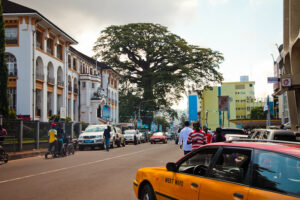The establishment of the “Province of Freedom” (Freetown, capital of Sierra Leone) is one of the first steps towards the abolition of the British slave trade. In 1772 slavery was prohibited in Great Britain, but did not apply to British overseas territories. Freetown was established as a permanent home for slaves (largely owned by British plantation owners in the Caribbean) brought to England.

Old Cotton Tree in Freetown. The cotton tree (Ceiba pentandra) is probably the most famous landmark in Freetown. When the group of freed slaves who settled the city first arrived on shore in 1787, they are said to have rested and prayed in the shade of this tree.
Credit: bobthemagicdragon. Attribution-NonCommerical-NoDerivs 2.0 Generic (CC BY-NC-ND 2.0). https://www.flickr.com/photos/bobthemagicdragon/7003920506/
The establishment of Freetown was championed by the British “Committee for the Relief of the Black Poor” which proposed a scheme for repatriation of the slaves to a territory in Africa where they could be free and govern themselves. In 1787, the first group of about four hundred free black slaves were sent to Freetown. Although, with African ancestry, these people were all newcomers to the continent, and they suffered various setbacks adapting into their new home.
Over 85,000 were relocated to Freetown (some forcibly) by the Royal Navy after the official British slavery abolition in 1808. These people of African descent born outside of the continent during the colonial era are part of the Creole ethnic group in Sierra Leone. The diverse sources of Freetown’s settlers—drawn from North America, the Caribbean, and Sierra Leone’s ethnic group is a strength but also responsible for competitive ethno-political identities and class formation in Sierra Leone.